The Department of Biology and Evolution of Marine Organisms (BEOM) focus on fundamental biological mechanisms in marine organisms allowing animals to deal with the challenge of Life on Earth.
By applying multi-faceted approaches we focus on i. the regulatory mechanisms that direct development of organisms from fertilization to adulthood, and ii. the genomic, cellular, and neural machinery underlying biological, physiological and behavioral plasticity of organisms to tackle adaptation and evolution.
The study of marine organisms allow us to exploit possible sources of natural products and metabolic processes for the use in biotechnology including the food industry and human health.
The know-how and expertise of researchers, technologists and technicians belonging to BEOM cover a broad spectrum of scientific fields, including molecular biology, biology of reproduction and development, signal transduction, gene regulation and genetics, bioinformatics, comparative genomics, cell biology, physiology, ecotoxicology, biochemistry, zoology, physiology, neurosciences and behavioral biology. These skills benefit from the availability and extensive experience working on different species at different evolutionary distances belonging to Protostomes and Deuterostomes.
Research activities include field and laboratory based experiments by applying numerous techniques including, for example: manipulation of gene function such as knock-down, knock-out and transgenesis by microinjection and electroporation; high-throughput genomics, transcriptomics (microarray, RNA-Seq, ChIP-Seq, and Real Time quantitative PCR); biological assays, spectrophotometry, spectrofluorimetry; high-resolution imaging using Confocal Laser Sheet Microscopy (CLSM) associated with fluorescent in situ hybridization (FISH) and immunohistochemistry; classical and electron microscopy (SEM, TEM); electrophysiology and behavioral and cognitive neuroscience methods.
ABBaCo - Restauro Ambientale e Balneabilità del SIN Bagnoli-Coroglio
DIsCO - Diatom life cycles, molecular controls and contribution to ecosystem dynamics
EMSO MedIT - Project financed in the framework of PON R&C 2007-2013 - PAC Enhancement of public research infrastructures
GRASSMET - Climate change effects on seagrass secondary metabolism: ecological implications
HEATGRASS - Tolerance to HEAT stress induced by climate change in the seaGRASS Posidonia oceanica
HighGrass - High-CO2 effects on seagrass photosynthetic ecophysiology
INBALANCE - INvertebrate-BActeriaL Associations as hotspots of benthic Nitrogen Cycling in Estuarine ecosystems
IRMA - Implementation and Remote Connection for Real Time Moniotoring of Marine Microorganisms - Funded by the Italian Ministry of University and Education (MIUR)
PALEOPARK - Seagrass palaeo-records as a tool for the evaluation, diagnosis and prognosis of the evolution of species, communities, and processes in Spanish insular National Parks
RECCAM - Seagrass Meadows resilience to global warming: an analysis based on responses at ecophysiological, population and ecosystem levels
PON01_02093 Study of new technologies and technological platforms for the improvement of production processes of active pharmaceutical ingredients of industrial interest and search for new bioactive molecules from natural sources
Leader: Sanofi-Aventis S.p.A.
PON01_02782 New nanotechnological strategies for the development of drugs and diagnostic tools directed to circulating cancer cells (CTC).
Leader: Biogem S.c.a r.l
PON01_00117 Antigens and Adjuvants for Vaccines and Immunotherapy.
Leader: Novartis Vaccines & Diagnostics Ltd.
RESIGRASS - An holistic understanding of seagrass functioning and resilience to local-scale disturbances: from molecular to biogeographical scales
S&T MED - Financed by the ENPI CBC Mediterranean Sea Basin 2007/2013 Program of the European Union
AmphioxusNOS - Marie Curie Career Integration Grant (FP7-PEOPLE-2011-CIG)
Corbel - Coordinated Research Infrastructures Building Enduring Life-science Services
EvoCell - Animal evolution from a cell type perspective: multidisciplinary training in single-cell genomics, evo-devo and in science outreach
FIRB, MIUR-Cineca - Non-Coding RNA Explosion: Novel Implications in Neurotrophin Biology
MouZeCLINIC - Empowering an integrated platform for the study of human diseases with great impact by means of system phenotyping of model animals: mouse and zebrafish clinic
Neptune - Multidisciplinarity training in evo-devo and neurobiology of marine animal models
PANTRAC - Gut patterning and PANcreas development in evolution and disease: a TRAnsCriptomic approach
Responsible: Adrianna Ianora
Activities
The Biotechnology Laboratory is a multidisciplinary lab that uses and develops different approaches dedicated to the study of marine drug discovery. Research activities include sampling, isolation and maintenance of marine species of biotechnological interest (especially microalgae), preparation of chemical extracts, testing the potential bioactivity at the gene and protein levels of extracts on human cells and model marine organisms.
Experimental Systems
- Molecular and chemical facilities applied to marine biotechnology.
- Human cell culture chambers (biological hood type 1, incubator for human cells, microscopes).
- Rooms for microalgal growth.
- Room with 2 Bioreactors.
Analysis
- Isolation and maintenance of microalgae for potential biotechnological applications.
- Cultivation of microalgae at the small (flasks), medium (10L carboys) and large scale (photobioreactors 100 L).
- Genotyping of new species by DNA sequencing.
- Bioassays testing biological activity of extracts, fractions and pure compounds on marine model species and human cell lines.
- Antiproliferative and clonogenic bioassays against aggressive tumor cell lines.
- Antioxidant and anti-inflammatory bioassays on normal cell lines.
- Cellular senescence (anti-aging)bioassays.
- Chronic human diseases (diabetes, Alzheimer's, Crohn's disease) bioassays.
- Molecular studies at the gene and protein levels to identify specific pathways activated by bioactive compounds on human cells (retroviral transfection, PCR array, immunoblot, ELISA).
- Transcriptome analysis of microalgal species.
Equipment
- Basic instrumentation for molecular biology and protein analysis (PCR, centrifuges, electrophoresis apparatus, transilluminator, thermostatic baths, spectrophotometer, pH meter, transblot).
- Biological Type 2 hood for micralgal cultures.
- Chemical hood.
- Microscopes.
- 2 photobioreactors (100 L).
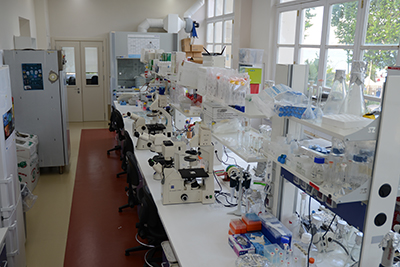
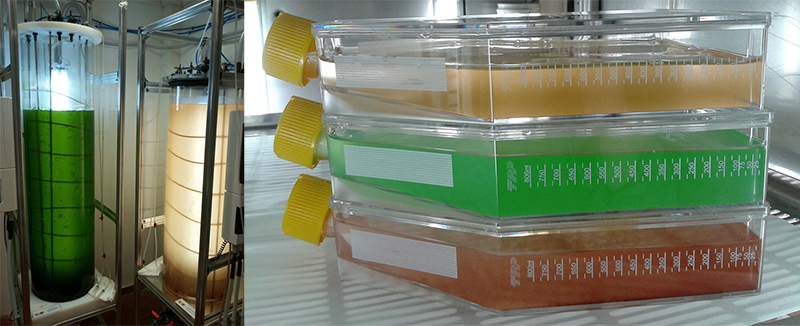
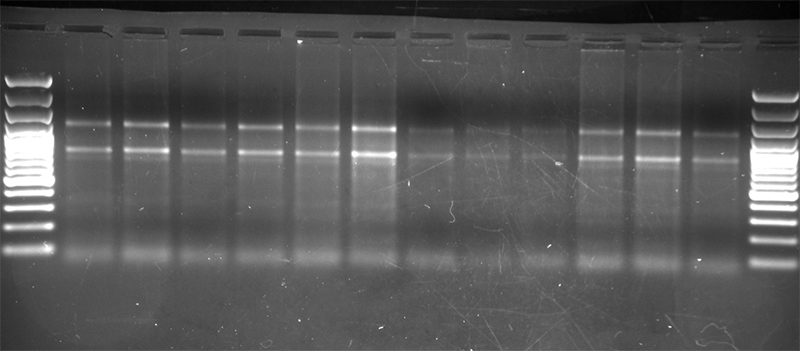
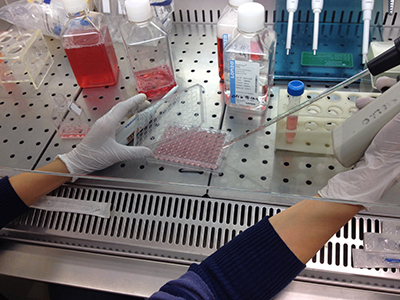
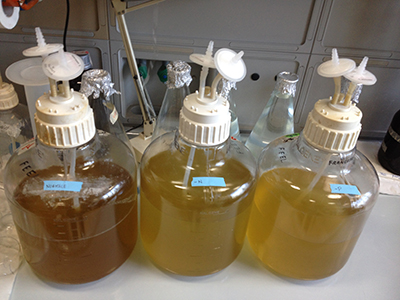
Reference: Anna Palumbo
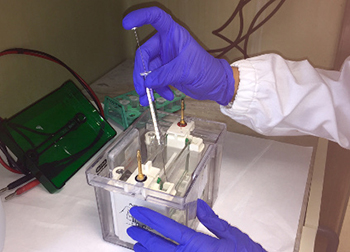 Laboratory equipped for studies of the biochemistry of marine organisms including adaptive responses and immune system.
Laboratory equipped for studies of the biochemistry of marine organisms including adaptive responses and immune system.
It includes an area for analysis of proteins and nucleic acids, and classic and basic biological laboratory equipments.
Systems for the experimentation
- UV Spectrophotometer UV, recording spectra of UV/visible and enzyme kinetics.
- electrophoresis on polyacrylamide and agarose gel.
- Centrifuges.
- Chromatography.
 Analysis
Analysis
- Measure of the response of marine organisms (adult and embryonic and larval stages) to environmental factors.
- Morphological characterization and evaluation of biochemical parameters (doses of enzyme activities, evaluation of the cellular redox state).
- Gene Expression, proteins and post-translational modifications induced by stress.
- Purification and biological characterization of proteins and metabolites from marine organisms.










